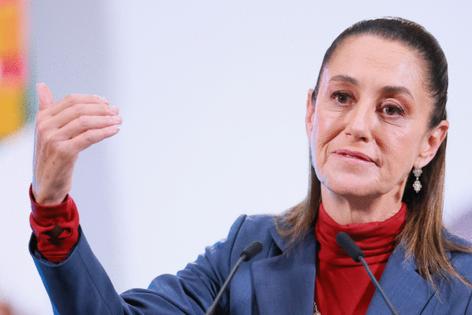Why the Mexican president refuses to restart the drug war despite mayor's assassination
Published in News & Features
MEXICO CITY — Mexican President Claudia Sheinbaum ruled out a new “war on drugs” as a response to the assassination of a regional mayor who was shot at a Day of the Dead celebration, a brazen killing that has sparked national outrage.
“Returning to the war against el narco is not an option,” Sheinbaum told reporters Monday, referring to the bloody anti-crime offensive launched almost two decades ago. “Mexico already did that, and the violence got worse.”
The president spoke as the nation was reeling from the killing Saturday of Carlos Manzo, mayor of Uruapan in the west-central state of Michoacán, which has become an organized-crime battleground. She condemned the assassination as “vile” and vowed to track down his killers.
While Mexican mayors and other local officials are frequent cartel targets — scores have been assassinated in recent years as gangs fight for control of city halls, budgets and police forces — the killing of Manzo struck a nerve nationwide.
Manzo, 40, gained notoriety as an outspoken proponent of taking a hard-line against the cartels that have overrun many regions of Mexico. According to Manzo, police and prosecutors coddle criminals ill-deserving of legal protections.
Manzo’s unyielding stance won him considerable popularity in a nation where polls show security remains citizens’ major concern — despite Sheinbaum’s frequent citing of official figures showing that homicides and other violent crimes are decreasing.
“The murder of the mayor is a clear signal of what we all know but what the government of President Sheinbaum denies: The country is governed by narco-traffickers,” Felipe Rosas Montesinos, 45, a flower salesman in Mexico City, said. “And if anyone challenges el narco, like the mayor of Uruapan did, they will kill him.”
Added Gilberto Santamaría, 37, a mechanic: “This makes one feel defeated, losing hope that anything will ever change.”
Manzo — who split with Sheinbaum’s ruling, center-left Morena party — was among a number of voices across Latin America who have called for more aggressive tactics to combat crime. Some labeled Manzo the “Mexican Bukele,” after Salvadoran President Nayib Bukele, who has locked up tens of thousands of alleged gang members, many without due process, according to human rights advocates.
The mayor’s killing “feels like a terror movie in which the bad guys win,” said María Guadalupe Rodríguez, 51, a nurse. “The sad part is that it’s not a movie: It’s what we live with in Mexico.”
A day after Manzo’s killing, protesters filled the streets of Uruapan and Morelia, the capital of Michoacán state. Many condemned Sheinbaum and her Morena party for what they called a permissive attitude toward crime.
While the protests were mostly peaceful, authorities said, some demonstrators broke into the state government palace in Morelia and trashed offices and other installations. Police responded with tear gas and arrested at least eight vandalism suspects.
Manzo was shot multiple times Saturday at a candlelight Day of the Dead festival that he was attending with his family in downtown Uruapan. One suspect was killed and two accomplices arrested, police said.
The killing was a well-planned cartel hit, Security Minister Omar García Harfuch told reporters.
The suspects managed to circumvent Manzo’s contingent of bodyguards, García Harfuch said. Authorities were investigating which of the area’s many mobs were behind the slaying.
Uruapan, a city of more than 300,000, is situated in the verdant hills of Michoacán, where most of Mexico’s avocados are grown. The lucrative industry — “green gold” generates $3 billion annually in exports to the United States — has for years been the target of a patchwork of armed groups who extort money from growers, packers, truckers and others.
Almost 20 years ago, then-President Felipe Calderón chose Michoacán as the launching pad for a nationwide war on drugs, deploying troops to combat the growing power of cartels. That strategy is widely believed to have had the unintended consequence of increasing violence: Gangs acquired ever-more powerful weapons to match the firepower of the armed forces, while cartel infighting accelerated as police captured or killed capos.
Upon taking office in 2018, President Andrés Manuel López Obrador promised a different approach, saying the military deployment had turned Mexico into a “graveyard.” He instructed troops to refrain from direct confrontations with cartels, when possible, and vowed to attend to poverty and other underlying social-economic social forces behind the violence.
Critics labeled López Obrador’s “hugs not bullets” strategy a disaster, as violent crime spiked.
Sheinbaum, a protege of López Obrador, embraced her predecessor’s approach but sought to improve Mexico’s intelligence-gathering and investigatory powers and strengthen the rule of law. Her government has aggressively arrested thousands of cartel suspects, several dozen of whom were sent to the United States to face trial.
For Manzo, however, Sheinbaum’s strategy was a rebranded incarnation of “hugs not bullets.”
The war on drugs, experts say, did nothing to cut the flow of cocaine, synthetic opiates like fentanyl and other substances to the United States, the world’s major consumer. And Mexico’s cartels, by all accounts, have only gotten stronger in recent years, despite the take-down of numerous kingpins.
____
(Special correspondent Cecilia Sánchez Vidal contributed.)
©2025 Los Angeles Times. Visit at latimes.com. Distributed by Tribune Content Agency, LLC.







Comments